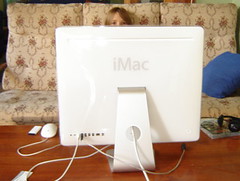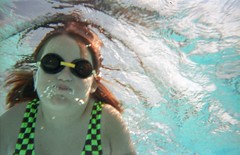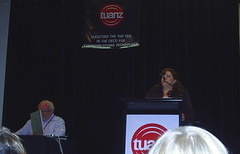My friend Paul at Ddraig Goch Pod was remarking recently that New Zealand is getting all the quality Professional Development lately, and I'm afraid he might be right. In the last few years I have had the privilege of attending workshops by Jason Ohler, Marc Prensky, Bernie Dodge, Tom Marsh, Ian Jukes, Tony Ryan, Jamie McKenzie, David Warlick and today I am sitting in a two day seminar run by Australian Educator Kath Murdoch.
This may be a long post as I am recording my notes while in the seminar.
Kath is the author of the book "Classroom Connections" and we follow her inquiry model in our classrooms in my ICT cluster in Dunedin. Kath has asked us to document our personal learning goal for the day... hmmm... I would like to consolidate my knowledge of Inquiry learning and the theory behind it to help in my role in supporting schools in my cluster. To achieve my goal I think I will record my questions here to help me think about them later and link my new knowledge to my previous thinking. As always, I think questions are the answer to learning!
To begin with inquiry in the classroom you need to help students understand that learning is something they do for themselves and not what is 'done' to them. By setting goals students take ownership of their own learning - "learning is something I do, not something done to me".
Why do you think it is worth using an Inquiry Learning approach? Inquiry is a teaching method that comes naturally to me and just makes sense. Think about your own learning style. Do you learn because people tell you to? Or because you have a burning question you would like answered? I hold to a social constructivist model of teaching and learning, (see my previous post) and Inquiry fits with this theory.
Kath states: Why inquiry?
- Vehicle for integration of the curriculum
- fosters connected rather than episodic teaching and learning
- Caters for range of learning styles
- Transferable process
- Taps into students' curiosity
To illustrate this point Kath uses a great text for teaching about questioning and how children learn, Stella, star of the sea written by Marie-Louise Gay, published by Allen & Unwin, 1999.
 Kath asked, are you more like the character Sam or Stella?
Kath asked, are you more like the character Sam or Stella?
What view of the child does this text portray?
In this text I see Sam as the questioning inquiring child, and Stella as the creative child who has an answer that constantly changes, her answer is constructed through her world view. Students all have theories about how the world works. We need to be able to draw these theories from the students and then gently shape these theories by allowing them to question and make more connections. This book also highlights the different learning styles students may have.
What view of the child does an inquiry approach assume?
Kath states: In an inquiry approach, we must firmly believe in students as:
- curious
- searching for meaning
- intelligent in a range of ways
- experienced - something to offer
- thinkers
- collaborators
- active
- risk takers
- co-learners
- co-teachers
Kath has developed an inquiry approach that takes you through certain steps. She is, in this workshop, taking us through the inquiry model to investigate the inquiry model.
The first step is 'Tuning In'. This is where you engage students in the topic at hand. This begins the 'wonderings', students begin to think of questions they might have. But it is not essential for students to have questions at this stage, these questions will continue to be asked during the next stages.
The next step is 'Finding Out' where students gather in information about the topic. This step is followed closely by 'Sorting Out' where students use this information in a certain way.
Finding out: We were asked to consider these questions:
- What is the difference between themes and inquiry?
- List two advantages of using inquiry
- List two challenges in using inquiry
- List three skills students will need to carry out an inquiry
- List three skills teachers will need to carry out an inquiry
- List two questions you have about inquiry.
Sorting out:
After sorting through all the data we had gathered something occurred to me. Inquiry takes more time than traditional direct instruction, but wow! it is so much more powerful. When the students have to engage with the data rather than the teacher interpreting it for them powerful learning occurs. As teachers we really need to stop doing things for our students just to make sure we cover enough 'content'. If I think about sorting data, the question of what is more important, content or process comes to mind. The students are engaging with the data in a meaningful way and they are internalising it as they have to sort it. But the process of sorting it is a skill they will be able to transfer to many other situations. In inquiry - what you learn about makes a difference to the skills you use and vice versa. The content has to be worth learning about, be of value and interest to the students and to the wider world.
My first day of the workshop is now finished. I am exhausted because I have been thinking so hard. I am brought back to the question that always haunts me. If we know this approach is of such value how can we get it into more classrooms?
I have been reading an article by Paul A. Kirschner, John Sweller, and Richard E. Clark entitled Why Minimal Guidance During Instruction Does Not Work: An Analysis of the Failure of Constructivist, Discovery, Problem-Based, Experiential, and Inquiry-Based Teaching. Others have critiqued this article here. I found myself arguing out loud as I read this article. And this article represents why a lot of teachers do not adopt Inquiry Based Learning in their classrooms. There is a misconception that Inquiry means letting the kids loose on learning with 'minimal instruction'. Inquiry is not an either / or dichotomy. It does not mean that you either teach them or let them teach themselves. It is a rigorously framed and supported structure that relies on the elements in Vygotsky's zone of proximal development to guide students through their learning. In Kath's model, Inquiry means engaging students in deeper more meaningful learning than direct instruction alone can offer.
If you have not yet looked into Inquiry Based Learning I encourage you to do so. It suits the way that digital natives learn, it fits with the idea of 'clickability' that today's kids hold. Learning is finding the answers to the questions I have. A talented teacher helps students to find and focus those questions to find out about their world and their place in it.
Can't wait for part two.
technorati tags:kath_murdoch, Inquiry_Based_Learning, IBL, constructivism
Blogged with Flock











